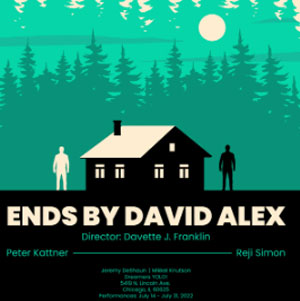
 [rating=5]“Ends” by David Alex is a character study of two men from widely diverse backgrounds and experiences, who grudgingly form a bond between them. A powerful take on the proverbial Rip Van Winkle story, Alex’s forceful and discerning sociopolitical drama pulls no punches when it comes to discussions about race and racism during the mid-twentieth century. Did things ever really change for African Americans as a consequence of the Civil Rights movement of the 1950s and early 1960s, except perhaps in a limited way? Likewise, by implication, the show allows us to reflect on our own times and make the implicit comparison between now and then in the area of civil rights. Today in 2022, what can we say about progress or regress in race relations between blacks and whites over the past sixty years?
[rating=5]“Ends” by David Alex is a character study of two men from widely diverse backgrounds and experiences, who grudgingly form a bond between them. A powerful take on the proverbial Rip Van Winkle story, Alex’s forceful and discerning sociopolitical drama pulls no punches when it comes to discussions about race and racism during the mid-twentieth century. Did things ever really change for African Americans as a consequence of the Civil Rights movement of the 1950s and early 1960s, except perhaps in a limited way? Likewise, by implication, the show allows us to reflect on our own times and make the implicit comparison between now and then in the area of civil rights. Today in 2022, what can we say about progress or regress in race relations between blacks and whites over the past sixty years?
In a superb performance, Reji Simon plays the character of Adam Kingsley with elegance, aplomb, and skill. Kingsley is a well-educated black man who lives alone in the forest, isolated from the rest of the humanity and well-versed in his knowledge of white and black authors. Among other things, he recites monologues taken from W.E.B. Du Bois as eloquently as he does from Shakespeare—and refers to both of them as William. His possessions are his friends, which he calls by the name of their inventors. One day, there is a knock on his door, and Frank Glober (Peter Kattner III), literally appears on his doorstep, seeking refuge from a violent rainstorm. Frank is a former U.S. Marine and Vietnam veteran, and Adam is suspect about him, in part because he’s white and also because he’s a stranger. Enraged at Frank’s presence, Adam doesn’t want to let him inside; he wants to be left alone! Frank insists, however, and barges into the cabin, and after a series of missteps, the two begin to talk to each other. That is when Adam learns that it is the year 1967 and no longer 1949, the year his father went missing. Adam was twelve at the time, and now he is thirty years old.
What engrosses the audience is that the two men are opposites and that we become privy to their conversation. Frank is very plain-spoken and poorly educated in sharp contrast to Adam’s constant references to scholarly works. Until his recent tour of duty in Vietnam (when he became disillusioned with the war), Frank has never had a reason to question his love of country and has never considered the possibility that his government might be acting contrary to his own best interests. In sharp contrast, Adam, being black, has had reason to question the good will of his government and his country every single day of his life.
Character development is splendid in this show, and we see how both men learn and grow throughout the performance. Adam teaches Frank that books are not hollow, that they contain a thoughtful reflection on the human condition. At the same time, Frank teaches Adam that life is not just about words: that the authors had to live life first before they put pen to paper. He also asserts that principles must be fought for. Such are the messages of authors like Frederick Douglass and Dr. Martin Luther King, Jr., who worked to make the nation live up to its promise. Frank’s perspective on life has largely been informed by white privilege, so as compared to Adam, he is more idealistic about the possibility of achieving lofty social goals. Since he has never had to overcome discrimination due to race or skin color, he fails to understand that, as a black man, Adam starts out with one hand tied behind his back if he wants to fight the battle for what is good and just.
Despite its serious theme, the play contains a good deal of comedy, largely grounded in the two men’s very different understandings of what makes the world tick. What permeates the show is an intelligent and subtle dry humor often based on word play and the overlapping of distinct subcultures and points of view. At one time, Frank likens his association with Adam to the mismatch of Laurel and Hardy. But Adam is resentful of this analogy. It’s not that Laurel and Hardy’s comedy is too low-class, but Adam is too self-absorbed and takes himself much too seriously. Note that an incredible amount of research went into Alex’s writing of this script. He not only had to mull over a ton of influential books but had to consider the timbre of quoted passages that are recited at different points in the show. Due to the wonderful direction by Davette J. Franklin, the two main characters are constantly aligned in such a way that adds to the tension of the script. Plus she achieves the perfect balance between what is thoughtful and what is funny without minimizing the strengths of these finely hewn characters.
Jay Dunley does a great job with the violence design and fight choreography, a portion of which is aikido-inspired. Kevin Rolfs’ set design is nicely done and utilizes the storefront stage to its maximum. The set gives us the feel that we are actually inside a small forest cabin. Costumes by Robert Eric West are appropriate to the era. Lighting and sound design by Sallie Anne Young is good, especially the roll-ins of songs and music, though at moments the mix could have favored the actors’ voices.
What is important to the story are 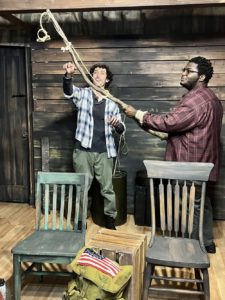 the bookend songs that feature Paul Robeson, who sings so eloquently in support of the U.S.A. But note that because of his personal history of support for the former Soviet Union as well as civil rights causes, the FBI questioned his loyalty. The character of Adam has some of this quality. In fact, during the course of this show, the elephant in the room is Joseph Stalin. During Adam’s eighteen years of willful slumber at his hideout, he never woke up to the fact that Stalin killed so many of his own people in the former Soviet Union through famines and mass killings in the name of Communism. So when Adam says that the only place where a black man can attain freedom is in the U.S.S.R., he is greeted by a huge laugh from Frank. Maybe Adam’s father was not able to assert his right to vote in the States, but in the U.S.S.R., he probably would have been sent off to Siberia.
the bookend songs that feature Paul Robeson, who sings so eloquently in support of the U.S.A. But note that because of his personal history of support for the former Soviet Union as well as civil rights causes, the FBI questioned his loyalty. The character of Adam has some of this quality. In fact, during the course of this show, the elephant in the room is Joseph Stalin. During Adam’s eighteen years of willful slumber at his hideout, he never woke up to the fact that Stalin killed so many of his own people in the former Soviet Union through famines and mass killings in the name of Communism. So when Adam says that the only place where a black man can attain freedom is in the U.S.S.R., he is greeted by a huge laugh from Frank. Maybe Adam’s father was not able to assert his right to vote in the States, but in the U.S.S.R., he probably would have been sent off to Siberia.
While Adam and Frank feel that their country has let them down, the issue is what to do about it. “Ends” points to the end of the performance when Frank leaves and goes back into the world. The question, then, is whether Adam is willing to take the next step and conquer his fear of leaving his cabin. The playwright implies that while the goals of equality and equal treatment may be difficult to achieve and the means to reach these ends is far from perfect, the fear of failure should not serve as reason for not making the attempt. Remaining a hermit may be the easiest thing for Adam to do, but as President John F. Kennedy once said, “We choose to go to the moon in this decade and do the other things not because they are easy, but because they are hard.” Being fully human entails not only book-learning but also involves taking risks to try to make the world a better place and further the reach of humanity. Without taking such risks there can be no rewards.
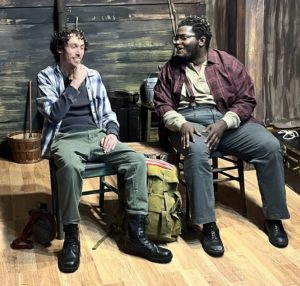 “Ends”, produced by DavJasFran Entertainment, is playing through July 31, 2022, at Dreamers YOLO, 5419 N. Lincoln Avenue, in Chicago. The venue is located in Budlong Woods, north of Lincoln Square, across the street from the police station.
“Ends”, produced by DavJasFran Entertainment, is playing through July 31, 2022, at Dreamers YOLO, 5419 N. Lincoln Avenue, in Chicago. The venue is located in Budlong Woods, north of Lincoln Square, across the street from the police station.
General admission tickets- $25
Students and industry tickets – $15
Performance schedule:
Thursdays, Fridays, and Saturdays – 7:30 p.m.
Sundays – 4:00 p.m.
To purchase tickets, visit https://www.davjasfranentertainment.com/ends-by-david-alex.
You may qualify for a $10 discount on a general admission ticket. Check the website for more information.
For specific details about this show or to learn more about DavJasFran Entertainment and how the company can foster new artists, contact the director at davette@davjasfranentertainment.com.
COVID protocols (as of today): You will be required to wear a mask throughout the entire performance. Note that seats are currently set six feet apart. The situation may change at any time.
To see what others are saying, visit www.theatreinchicago.com, go to Review Round-Up and click at “Ends”.



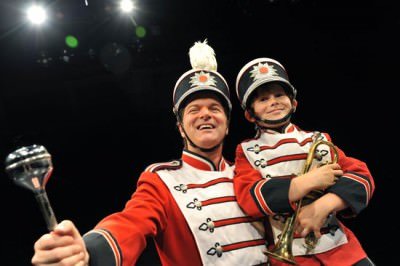
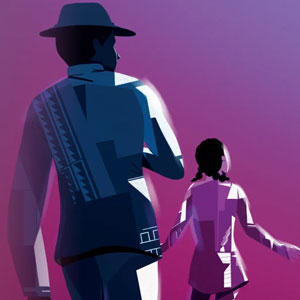
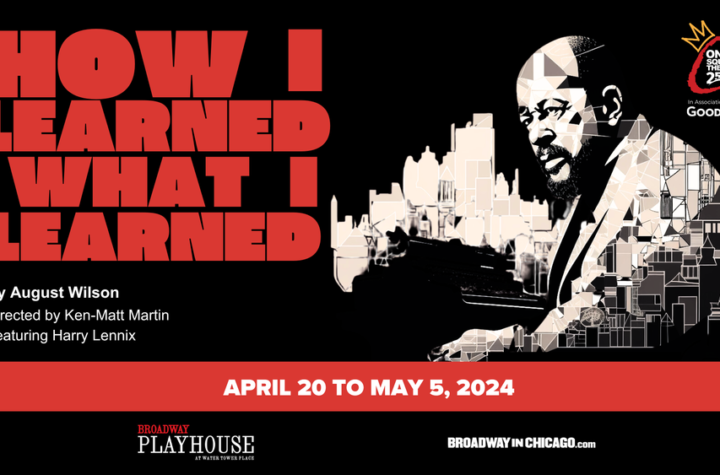
More Stories
“Barefoot in the Park”
“Joe Turner’s Come and Gone”
“How I Learned What I Learned” reviewed by Julia W. Rath